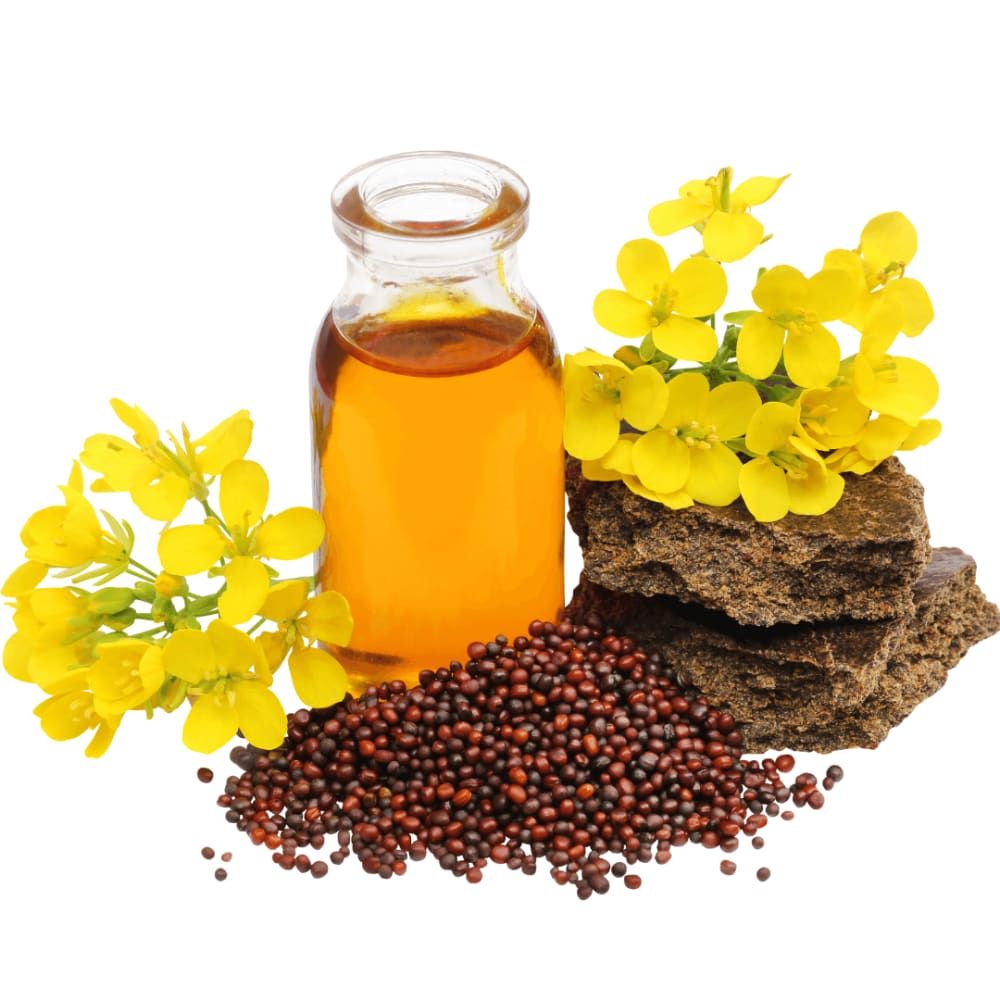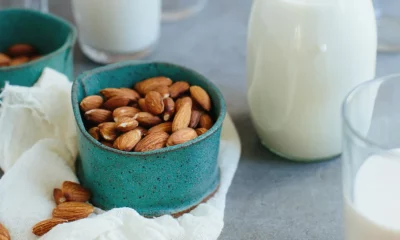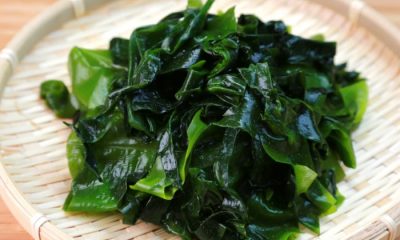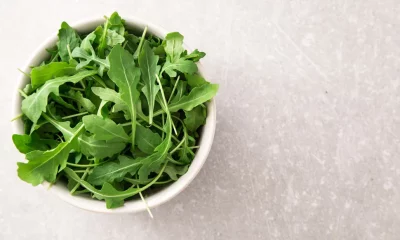Health
8 benefits of dandelion tea and side effects

Discover the 8 shocking benefits of dandelion tea and side effects.
What most people find to be an annoying weed, can be a healthy drink and a tasty tea.
Dandelions grow in gardens around the world every spring and last all summer.
Their bright yellow leaves are easy to spot and their seed pods are often used to make wishes.
These herbs offer powerful health benefits when consumed as food or in drinks such as tea.
We’ve put together a list of the health benefits of dandelion tea that will inspire you to brew a cup of this vibrant tea.
Whether you love the light floral flavor or prefer strong tastes like coffee, dandelion tea has something for everyone.
First, learn the health benefits of each type of tea here.
What is dandelion tea?
Dandelion tea is an herbal tea made from various parts of the dandelion plant. It is known as Taraxacum officinale.
There are several different types of dandelion tea depending on whether the tea is made from:
leaves,
flowers
or the roots of the plant.
One of the most common is known as roasted dandelion root tea or “ dandelion coffee ”.
The tea gets its name from the dark color of the roasted root, which resembles coffee beans.
This type of dandelion tea is often used as a coffee substitute.
Flavor profile
Dandelion tea made from flower petals offers a delicate and sweet taste.
Roasted dandelion teas offer a bolder flavor with smoky and toasted notes that are paired with a robust flavor.
Dandelion leaf teas offer an earthy, herbaceous flavor that may have astringent notes.
Health Benefits of Dandelion Tea
1. Contains large amounts of fiber
Dandelion leaves contain high concentrations of fiber, which helps to streamline digestion and improve overall health.
Eating a diet high in fiber can help improve digestive health and relieve intestinal tension.
The dietary fiber in dandelion leaves can also help prevent digestive system problems such as:
irritable bowel syndrome
kidney stones.
2. Rich in vitamin A
Dandelion leaves are full of vitamin A, which can help improve the appearance of your skin. They also reduce inflammation.
Vitamin A is also essential for healthy vision and can prevent serious problems like macular degeneration.
Dandelion tea is known for its cleansing properties
Vitamin A may also ease symptoms of measles, a disease rare in the United States, but which has recently increased in frequency due to anti-vaccination movements.
Taking vitamin A can shorten the duration of symptoms, including:
upset stomach
diarrhea
and fever.
3. Good for bone health
Dandelion root tea contains high amounts of vitamin K, which is known to help strengthen bones.
Studies show that vitamin K, especially K2, may be a better choice than calcium for bone health.
Calcium can cause stiffness in the arteries, which can increase the risk of blood clots.
Vitamin K2 offers the same mineral properties for bone health, with no side effects on heart health.
Drinking dandelion tea helps prevent fractures and breaks in bones that do not have high bone mineral density.
4. Helps target free radicals
Dandelion tea contains antioxidants that fight free radicals – compounds that can cause oxidative stress and damage to healthy cells.
Antioxidants work to remove free radicals from the body, thus protecting against long-term damage.
Free radicals have been linked to a host of health problems, including cancer and premature aging.
5. Benefits of dandelion tea for liver
Dandelion leaf tea can help protect liver function and aid digestion in general.
A study published in the Journal of Medicinal Food found that the antioxidant and anti-inflammatory properties of dandelion leaves help prevent liver damage in mice caused by unhealthy eating.
Dandelion tea contains vitamin C, which improves the absorption of minerals.
It also strengthens the immune system and prevents illnesses, including colds and flu.
The antioxidants in this tea also help stimulate bile production, which helps the body to break down and process food.
6. May help fight cancer
Dandelion root tea can cause certain types of cancer cells to die.
A study published in Evidence-Based Complementary Alternative Medicine looked at these cancer-fighting properties.
Researchers found that dandelion root extract – when combined with the diabetes drug metformin – could treat human melanoma G361.
7. Benefits of dandelion tea for urinary tract infections
Dandelion tea has natural diuretic properties.
These diuretic properties can also help regulate blood sugar levels. They improve the general state of health.
Consuming dandelion tea can help the body flush out toxins and wastes. This prevents bacterial infections in the urinary tract.
This happens because the healthy compounds in dandelion tea decrease inflammation and the diuretic effect increases urine output.
One study showed that these effects were most pronounced when dandelion was combined with uva ursi, known as bearberry.
8. Dandelion tea for weight loss
Dandelion teas can help speed up weight loss when used in conjunction with a healthy diet and exercise program.
Since tea has natural diuretic properties, it helps reduce water weight.
Dandelion tea is a natural diuretic
The antioxidants in dandelion leaves, dandelion flowers, and dandelion root extract also help speed up metabolism and improve fat burning.
Replacing sugary drinks with dandelion tea can also help reduce calories.
You still get a sweet and delicious flavor without the extra calories that can add up to the pounds.
The flavor of dandelion tea is also more exciting than that of plain water, so it’s easier to stay hydrated and stick to your diet.
Side effects of dandelion tea
If you are allergic to ragweed, you may also have an allergic reaction to dandelion tea.
Avoid drinking this herbal tea if you are allergic to dandelion or related plants including daisies and chrysanthemums.
Stop use immediately and contact a healthcare practitioner if you experience symptoms, including:
a rash
breathing difficulties
and an itchy throat.
Drugs interactions
Dandelions can inhibit the absorption of certain antibiotics, effectively decreasing the effectiveness of drugs.
If you are taking antibiotics, including Cipro and norfloxacin, talk to your health care provider before taking dandelion.
Dandelion can also interfere with certain diuretics and cause other side effects.
Dandelion tea is naturally caffeine-free
The main thing to watch out for is the potassium content.
Some diuretics contain potassium which when taken with dandelion herbal tea can reach unhealthy levels in the human body.
If you are taking any medication, always talk to your doctor before using any herbal or herbal teas.
Significantly increasing the consumption of dandelion tea in conjunction with medications for the liver may also decrease the effectiveness of these medications.
Consume this tea in moderation and check that the tea does not interact with your medications.
How to make dandelion tea
The process of brewing dandelion tea differs depending on the type of dandelion tea you are brewing.
In general, dandelion tea should be brewed using hot water or boiling water.
It is also better to use:
loose leaves,
fresh flowers
or dried roots rather than tea bags.
Leaves and flowers should steep for about 5-10 minutes, while roots are best 6-8 minutes.
Sunny and bright dandelion tea
Dandelion herbal tea is a delicious herbal tea that can bring sunshine to your world.
Vibrant flowers look gorgeous when infused in hot water and provide endless health benefits.
You can also opt for dandelion leaf or root teas if you prefer stronger flavors.
Pour yourself a delicious cup of dandelion tea and soak up the health benefits.
Health
Dangers and side effects of spirulina

Table of Contents
Health
5 health benefits of bananas for men

Table of Contents
Discover the 5 amazing health benefits of bananas for men.
Bananas have various male health benefits. They can be used effectively to fight against constipation, help protect the kidneys and more.
Bananas are rich in nutrients, including vitamins (A, C, and B6), minerals (potassium, magnesium, folate, riboflavin, niacin, thiamin, and iron), protein, carbohydrates, fat, and fiber.
<img class=”i-amphtml-intrinsic-sizer” style=”box-sizing: border-box; max-width: 100%; display: block !important;” role=”presentation” src=”data:;base64,” alt=”” aria-hidden=”true” /><img class=”i-amphtml-intrinsic-sizer” style=”box-sizing: border-box; max-width: 100%; display: block !important;” role=”presentation” src=”data:;base64,” alt=”” aria-hidden=”true” />
Due to their high nutritional content, bananas exhibit several benefits when consumed, especially for men.
1. Heart and nervous system
The high potassium content in bananas helps protect the heart and nervous system.
It also helps in muscle contraction.
Therefore, bananas are good for the heart, digestive system, and other muscles in the body.
That is why it is recommended to eat a banana before or after exercise.
Potassium also helps keep the heart rate at a normal rate.
Potassium and low sodium help keep blood pressure low.
2. Bananas for kidney and bones
The high potassium content of bananas also contributes to healthy kidney function and bone development.
This is because potassium retains the loss of calcium in the urine, which allows the body to absorb more minerals and thus strengthen the bones.
3. Bananas for blood and immune system
The high content of vitamin B6 supplies blood haemoglobin and maintains healthy blood sugar levels for the body by converting carbohydrates into glucose.
Vitamin B6 also helps the body make antibodies, which are used by the immune system to fight disease.
4. Bananas to improve mood
Bananas contain an amino acid called tryptophan, which is converted into serotonin in the body.
It maintains a positive mood and helps fight depression.
During stress, the body consumes potassium.
Because a banana contains around 400 milligrams of potassium, eating one a day can help you stay healthy during times of stress.
5. Bananas for weight management
The fibers present in bananas can help maintain regular bowel movements.
They can also help you feel fuller longer after eating.
We hope the article “5 health benefits of bananas for men” was of help to you.
Health
8 Benefits of mustard oil and side effects

Table of Contents
-

 Benefits4 months ago
Benefits4 months agoThe Benefits of Joining Gym Lumolog – Improve Your Fitness & Health
-

 Food1 year ago
Food1 year ago10 + Benefits of carrot juice and side effects
-

 Health1 year ago
Health1 year ago50 Super Healthy (And Very Often Cheap) Foods
-

 Health1 year ago
Health1 year ago5 Shocking health benefits of kinkeliba and side effects
-

 Health1 year ago
Health1 year ago15 health benefits of soursop leaves tea and side effects
-

 Food1 year ago
Food1 year ago8 shocking benefits of leek juice and side effects
-

 Health1 year ago
Health1 year ago15 Benefits of lipton tea and side effects
-

 Health1 year ago
Health1 year agoBenefits of guava leaves Sensually












